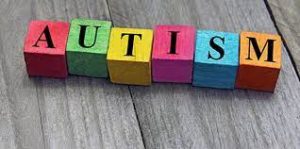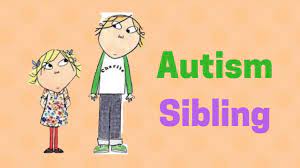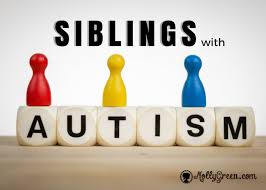
Navigating an autism diagnosis is difficult enough, let alone trying to explain it to your children. When talking about autism with your child, use age-appropriate words and concepts. For example, you children may be worried about their sibling’s unusual behaviors impacting their own life, while adolescents may be concerned with what their friends may think, teenagers may begin worrying about their role as a caregiver in the future, and adult siblings may be concerned about their genetic risk of autism for their own children. The autism conversation is something that will be continuous and dynamic throughout life.
Some things that are common sense to us, may not be common sense to children, like autism is not contagious. The more siblings can learn about autism, the greater their understanding and empathy will be during challenging times. The time involved in taking care of your autistic child may leave little time for your other children, so it is important that they have an understanding of WHY their autistic sibling does what they do. Without this understanding, siblings are more likely to experience jealousy, resentment, frustration and angst in your typically developing children, which are normal reactions.

Some of the more common feelings siblings express are:
- Not knowing how to connect with their sibling with autism
- Jealousy from lack of attention from and alone time with parents
- Concerns about privacy or safety
- Stress from increased responsibility
- Being the target of aggressive behavior
- Embarrassment around peers
- Trying to make up for the deficits of their brother/sister
- Concern regarding their parents’ stress and grief
- Concern over their role in future caregiving
Research shows that overall siblings cope well with the experiences they have while growing up and living with an autistic sibling. Having an autistic sibling teaches empathy, tolerance, acceptance, responsibility, social skills and many other positive character traits. Sometimes parents find that their child with autism is more social or verbal with their sibling than with anyone else. Siblings can learn basic strategies for positive engagement, like praising good behaviors, giving simple instructions, or modeling language expansion when playing together. Ask your BCBA or other trusted behavioral health expert for additional ideas.

Siblings of people with autism are more likely to
- Accept differences among people
- Be a loyal friend through good and bad times
- Learn how to tolerate different situations
- Be more mature than other kids their age
- Feel proud of their sibling with autism
It is important that your children without autism still feel important and special. There are certain times when it might be best to go on outings, participate in unique events, or create other social opportunities that focus on the siblings and highlight their unique strengths. It can be frustrating for kids to have to do everything with their special needs sibling. To help ease this frustration, provide outlets for siblings to share their experiences, either with you as a parent, a therapist, or in a peer support group. Peer support groups can make children feel less alone and give them tools to handle their frustrations.

Here are some common needs for siblings of autistic children:
- Open lines of communication
- Ongoing, age-appropriate information
- Praise for their accomplishments
- Special one-on-one time with their parents, whether it is 10 minutes before bed every night or a couple hours on the weekend.
- A way to interact with their sibling
- The choice to be as involved as they like, not forced into caring for their sibling with autism
- Personal safety for themself and their belongings
- Fair sibling responsibilities
- Validation of your child’s positive and negative feelings. Sharing your own emotions normalizes their experience.
- Whole family activities that don’t focus on one person
- Sibling support groups can provide an opportunity to feel understood and not alone
- Knowing how to answer peers’ questions

And here are some tips to share with your children who don’t have autism:
- Let your parents know when you need privacy or time with friends. Ask your parents to help you set up a place where you can work on projects, do homework or play games with friends away from your sibling with autism. It is important to have your own space.
- Schedule alone time with your parents. Use the time to do things that you like or are special for you and your parent, something you might not do together as a family.
- Participate in after-school activities, sports and clubs. It’s OK to have your own independent interests.
- Although sometimes it may seem like you’re the only one, there are lots of people who have a brother or sister with autism. Ask your parents to help you find out about autism resources for siblings. You may want to read a book, search the internet with your parents’ help, attend a sibling workshop or join a sibling support group.
- Learn about autism so that you can become comfortable talking about your sibling with friends and classmates. Explaining autism to others means that more people will become accepting of people who learn differently, and that’s good for everyone.
- Try to always keep in mind that he or she is still the same brother or sister you know and love, your family just has learned something new about him or her.

Other Resources:
Autism Speaks has a Sibling’s Guide to Autism that explains autism in an easy-to-understand way, directed towards siblings. The Organization for Autism Research also offers a couple different sibling autism guides as well.
Interested in services? Visit our website to submit a service inquiry form here. Let us know what topics you would like to learn more about: office@abainsight.net
